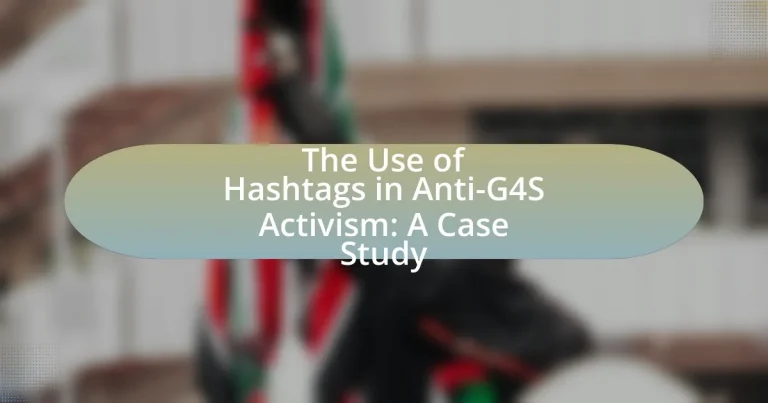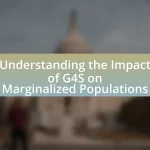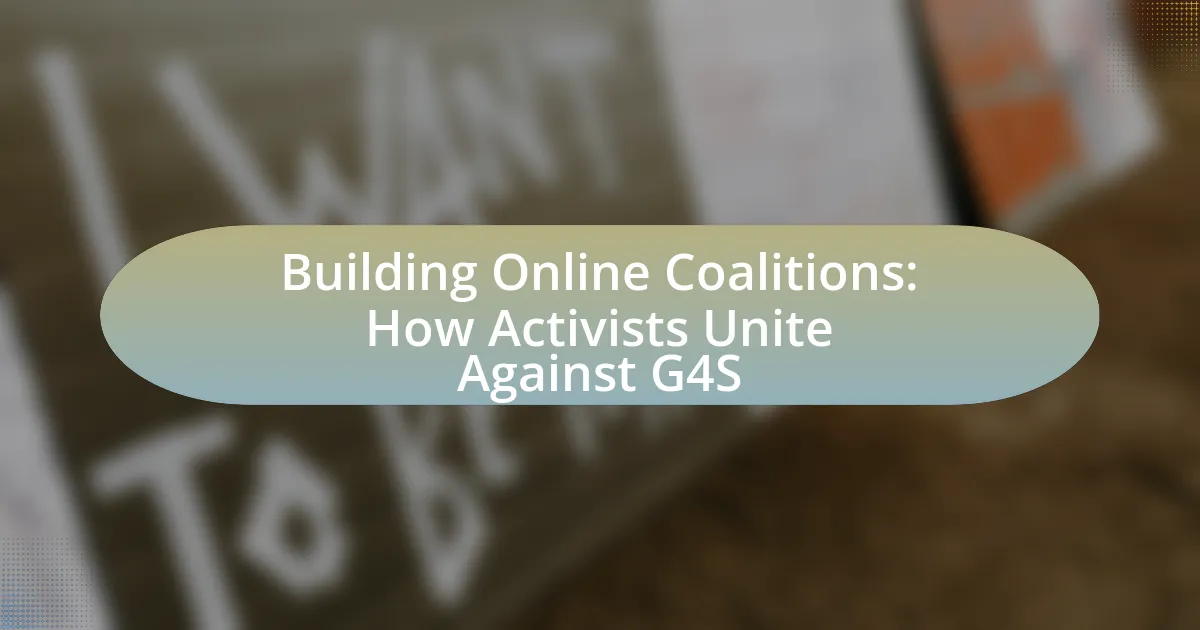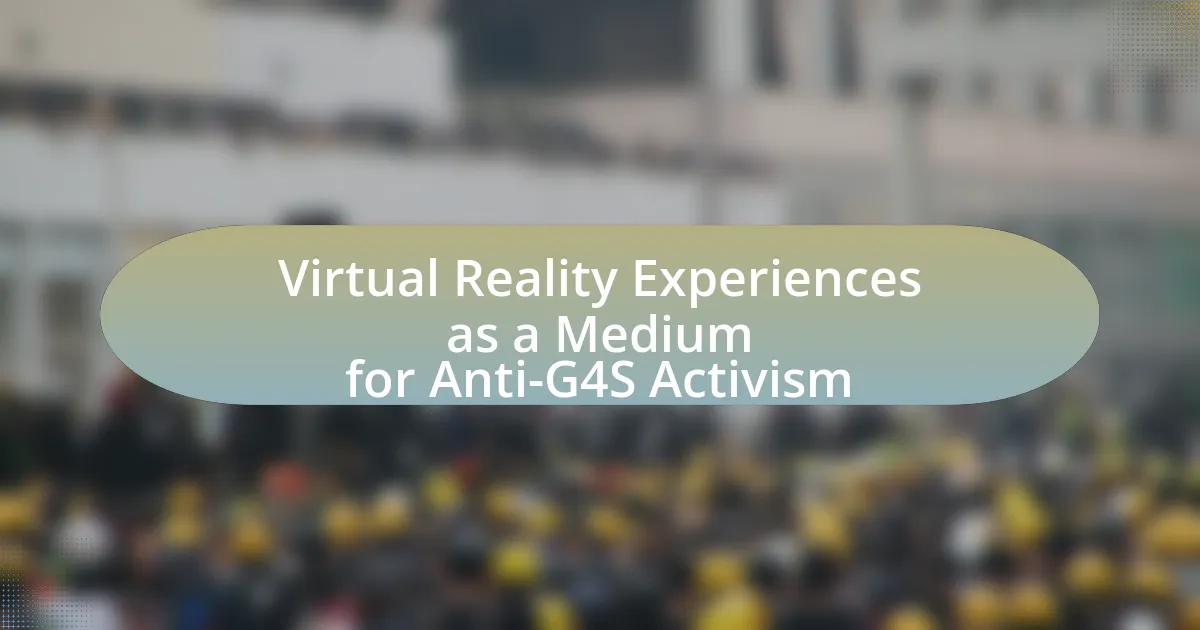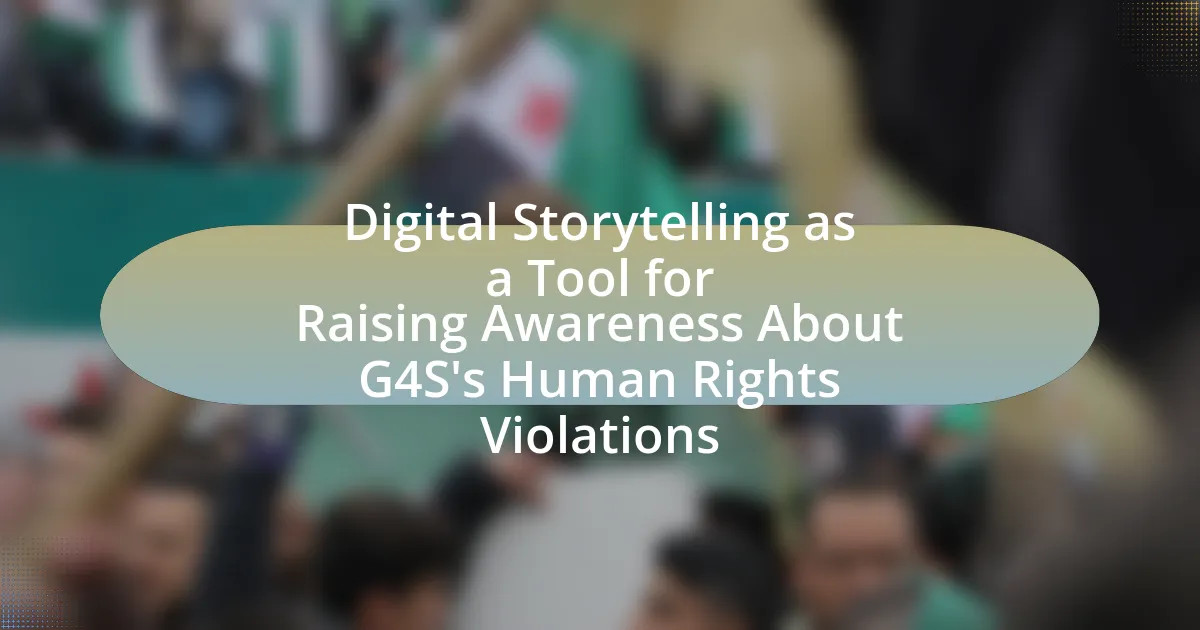The article examines the role of hashtags in anti-G4S activism, highlighting their importance in organizing, amplifying messages, and mobilizing support against the company known for its controversial practices. It discusses how hashtags facilitate communication among activists, categorize content, and increase visibility, thereby enhancing engagement in campaigns such as #BoycottG4S and #G4SAbuses. The article also explores strategies for creating effective hashtags, the impact of trending topics, and the challenges activists face, including misinformation and algorithmic bias. Additionally, it outlines best practices for using hashtags to ensure their relevance and effectiveness in driving awareness and influencing policy changes related to G4S.
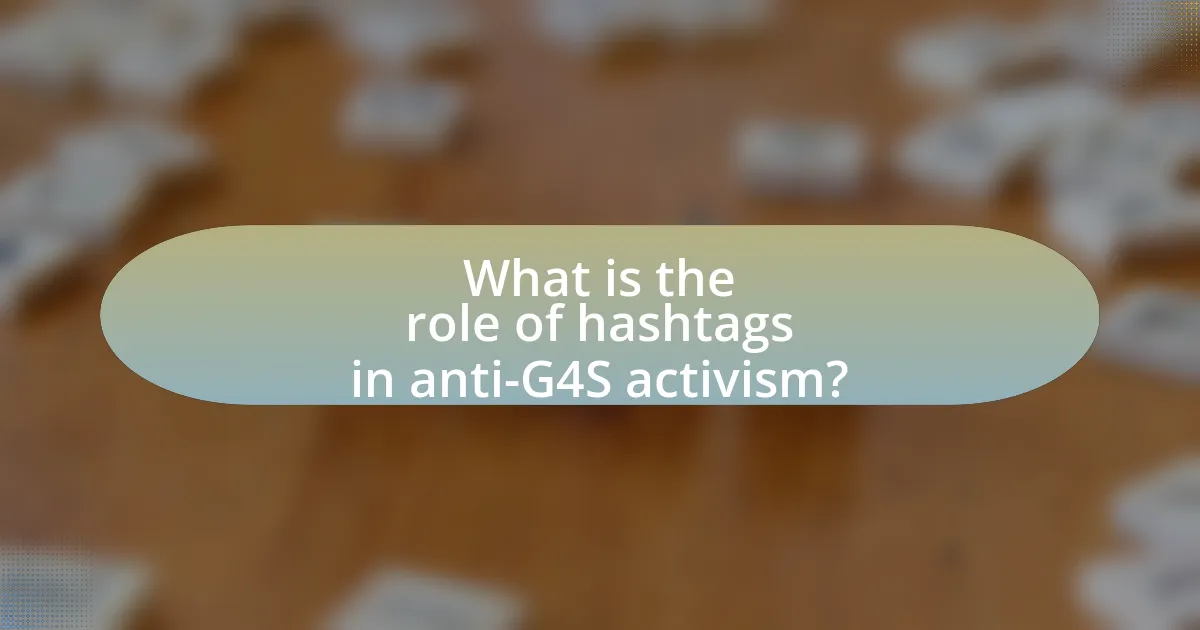
What is the role of hashtags in anti-G4S activism?
Hashtags play a crucial role in anti-G4S activism by facilitating the organization and amplification of messages against the company. They enable activists to categorize content, making it easier for individuals to find and engage with relevant discussions. For instance, hashtags like #BoycottG4S and #G4SAbuses have been used to raise awareness about the company’s involvement in human rights violations, particularly in relation to its contracts with governments and institutions. This strategic use of hashtags has been shown to increase visibility and mobilize support, as evidenced by the rise in social media engagement and participation in protests linked to these campaigns.
How do hashtags facilitate communication among activists?
Hashtags facilitate communication among activists by creating a unified platform for sharing information and mobilizing support. They serve as a digital rallying point, allowing activists to categorize their messages and connect with like-minded individuals. For instance, during the anti-G4S activism, hashtags like #StopG4S enabled activists to easily find and engage with relevant content, fostering a sense of community and urgency. This method of communication enhances visibility and amplifies the reach of their messages, as seen in the increased online engagement and participation in protests linked to specific hashtags.
What are the most commonly used hashtags in anti-G4S campaigns?
The most commonly used hashtags in anti-G4S campaigns include #G4S, #BoycottG4S, #G4SAbuses, and #EndG4S. These hashtags are frequently utilized by activists to raise awareness about the company’s controversial practices, including human rights violations and privatization of public services. The prevalence of these hashtags in social media discussions highlights the organized efforts of various groups to mobilize public opinion against G4S and to advocate for accountability and change.
How do hashtags help in mobilizing support for anti-G4S actions?
Hashtags help mobilize support for anti-G4S actions by creating a unified and recognizable label that facilitates the organization and dissemination of information. This collective tagging allows activists to easily share content, connect with like-minded individuals, and amplify their messages across social media platforms. For instance, the hashtag #BoycottG4S has been used to coordinate protests, share news articles, and mobilize community support, leading to increased visibility and engagement in anti-G4S campaigns. Research indicates that social media campaigns utilizing hashtags can significantly enhance participation rates and foster a sense of community among activists, thereby strengthening the overall impact of the movement.
Why are hashtags important for visibility in social movements?
Hashtags are crucial for visibility in social movements because they aggregate content, making it easier for users to find and engage with related discussions. By using specific hashtags, activists can connect their messages to broader conversations, increasing the likelihood of reaching a wider audience. For instance, during the Black Lives Matter movement, hashtags like #BlackLivesMatter facilitated the rapid dissemination of information and mobilization of supporters, leading to global awareness and participation in protests. This demonstrates that hashtags serve as powerful tools for organizing, raising awareness, and fostering community among activists.
How do hashtags increase the reach of anti-G4S messages?
Hashtags increase the reach of anti-G4S messages by categorizing content, making it discoverable to a broader audience. When users include specific hashtags related to anti-G4S activism, such as #StopG4S or #G4SAccountability, these tags aggregate posts across social media platforms, allowing individuals who are not directly connected to the original poster to find and engage with the content. Research indicates that posts with hashtags can receive up to 12.6% more engagement than those without, enhancing visibility and encouraging wider dissemination of the message. This mechanism facilitates the mobilization of supporters and amplifies the impact of the anti-G4S campaign.
What impact do hashtags have on public perception of G4S?
Hashtags significantly influence public perception of G4S by shaping narratives and mobilizing collective action against the company. The use of specific hashtags, such as #G4S and #BoycottG4S, amplifies criticisms related to human rights violations and unethical practices, leading to increased visibility of these issues. Research indicates that social media campaigns utilizing hashtags can lead to heightened awareness and public discourse, which in turn can affect G4S’s reputation and consumer behavior. For instance, a study by the University of California found that social media activism, particularly through hashtags, can result in a measurable decline in public trust and support for companies involved in controversial practices.

What strategies are employed in the use of hashtags for anti-G4S activism?
Anti-G4S activism employs several strategies in the use of hashtags, primarily focusing on raising awareness, mobilizing supporters, and creating a unified message. Activists utilize specific hashtags like #StopG4S and #G4SAbuses to consolidate information and experiences related to the company’s controversial practices, such as its involvement in the Israeli occupation and privatization of public services. This strategic use of hashtags facilitates the dissemination of information, encourages public discourse, and fosters community engagement, as evidenced by the increased visibility of campaigns and the ability to trend on social media platforms. Additionally, hashtags serve as a rallying point for organizing protests and events, amplifying the collective voice against G4S’s operations.
How do activists create effective hashtags?
Activists create effective hashtags by ensuring they are concise, memorable, and relevant to the cause. A well-crafted hashtag captures the essence of the movement, making it easy for supporters to engage and share. For instance, the hashtag #BlackLivesMatter became a rallying point due to its clarity and direct connection to the social justice movement, leading to widespread recognition and use across social media platforms. Additionally, effective hashtags often incorporate trending topics or current events, which can amplify their reach and impact. This strategic approach helps activists mobilize support and raise awareness efficiently.
What characteristics make a hashtag successful in activism?
A successful hashtag in activism is memorable, concise, and relevant to the cause it represents. Memorable hashtags, such as #BlackLivesMatter, are easy to recall and share, which enhances their visibility and engagement. Conciseness ensures that the hashtag can be quickly typed and recognized, facilitating its use across various platforms. Relevance ties the hashtag directly to the specific issues being addressed, allowing it to resonate with the target audience and attract supporters. For instance, the hashtag #MeToo effectively encapsulated a widespread movement against sexual harassment, leading to significant social discourse and mobilization.
How do activists adapt hashtags for different platforms?
Activists adapt hashtags for different platforms by tailoring their length, style, and context to fit the unique characteristics of each platform. For instance, on Twitter, where character limits are strict, activists often use concise and impactful hashtags that convey their message quickly, such as #StopG4S. In contrast, on Instagram, activists may employ longer, more descriptive hashtags that include additional context, like #EndG4SInjustice, to engage users visually and narratively. This adaptation is supported by the fact that different platforms have varying user engagement patterns; Twitter emphasizes brevity and immediacy, while Instagram focuses on visual storytelling and community building.
What role do trending topics play in hashtag usage?
Trending topics significantly enhance hashtag usage by increasing visibility and engagement. When a topic trends, it attracts a larger audience, prompting users to incorporate relevant hashtags to join the conversation. For instance, during social movements or significant events, hashtags related to trending topics can see a surge in usage, as evidenced by the #BlackLivesMatter movement, which gained momentum through trending discussions on social justice. This correlation between trending topics and hashtag activity demonstrates how real-time relevance can amplify the reach and impact of activism-related messages.
How can activists leverage trending hashtags to promote anti-G4S messages?
Activists can leverage trending hashtags to promote anti-G4S messages by strategically incorporating these hashtags into their social media posts to increase visibility and engagement. By using hashtags that are currently popular, activists can tap into existing conversations, thereby reaching a broader audience who may not be aware of G4S’s controversial practices, such as its involvement in private security and immigration enforcement. For instance, during significant events or movements, activists can align their anti-G4S messages with hashtags like #BlackLivesMatter or #EndPoliceBrutality, which have substantial traction and public interest. This approach not only amplifies their message but also connects it to larger social justice issues, making it more relatable and urgent. Research indicates that posts with trending hashtags can receive up to 12 times more engagement than those without, highlighting the effectiveness of this strategy in raising awareness and mobilizing support against G4S.
What are the risks of using trending hashtags in activism?
Using trending hashtags in activism poses several risks, including the potential for message dilution and misinterpretation. When activists adopt popular hashtags, their specific messages may become lost among unrelated content, leading to a lack of clarity and focus. Additionally, trending hashtags can attract attention from individuals or groups who may not share the same values, resulting in backlash or negative associations. For instance, the #BlackLivesMatter hashtag has been co-opted by various entities, sometimes undermining its original intent and causing confusion about the movement’s goals. Furthermore, the rapid pace of social media can lead to misinformation spreading quickly, complicating the activist’s message and objectives.

What are the outcomes of hashtag campaigns in anti-G4S activism?
Hashtag campaigns in anti-G4S activism have led to increased awareness, mobilization of supporters, and pressure on stakeholders. These campaigns have successfully highlighted issues related to G4S’s involvement in controversial practices, such as privatized detention and security services. For instance, the hashtag #ShutDownG4S gained traction during protests, resulting in significant media coverage and public discourse surrounding G4S’s operations. This visibility has prompted responses from organizations and institutions, including divestment from G4S by universities and advocacy groups, demonstrating the tangible impact of these digital campaigns on real-world actions and policies.
How do hashtags contribute to the success of anti-G4S initiatives?
Hashtags significantly enhance the success of anti-G4S initiatives by increasing visibility and facilitating community engagement. By categorizing content, hashtags allow activists to reach a broader audience, making it easier for individuals to discover and join the movement. For instance, the hashtag #StopG4S has been used in various campaigns, leading to increased participation in protests and online discussions, which amplifies the message against G4S’s controversial practices. Research indicates that social media campaigns utilizing targeted hashtags can increase engagement rates by up to 50%, demonstrating their effectiveness in mobilizing support and raising awareness.
What measurable impacts have been observed from hashtag campaigns?
Hashtag campaigns have demonstrated measurable impacts such as increased engagement, heightened awareness, and mobilization of supporters. For instance, the #BlackLivesMatter campaign significantly raised public consciousness about racial injustice, leading to a reported 1,000% increase in social media engagement during peak protest periods. Additionally, hashtag campaigns can drive real-world actions; the #MeToo movement resulted in a 50% increase in reports of sexual harassment and assault, showcasing the tangible effects of online activism. These statistics illustrate the effectiveness of hashtag campaigns in influencing public discourse and prompting social change.
How do hashtags influence policy changes regarding G4S?
Hashtags influence policy changes regarding G4S by amplifying public awareness and mobilizing collective action against the company’s practices. For instance, campaigns utilizing hashtags like #BoycottG4S have garnered significant attention on social media, leading to increased scrutiny from policymakers and stakeholders. This heightened visibility can pressure governments and institutions to reconsider contracts with G4S, as seen in various instances where public outcry has resulted in the cancellation of contracts or policy reviews. The effectiveness of hashtags in this context is supported by studies showing that social media activism can lead to tangible changes in corporate accountability and policy reform.
What challenges do activists face when using hashtags?
Activists face several challenges when using hashtags, including oversaturation, misinterpretation, and algorithmic bias. Oversaturation occurs when numerous hashtags dilute the impact of a specific message, making it difficult for activists to stand out in a crowded digital space. Misinterpretation arises when audiences misunderstand the intent behind a hashtag, leading to unintended consequences or backlash against the movement. Algorithmic bias can limit the visibility of certain hashtags, as social media platforms may prioritize content that aligns with mainstream narratives, thereby marginalizing activist voices. These challenges hinder the effectiveness of hashtags as tools for mobilization and awareness in activism.
How can misinformation affect hashtag campaigns?
Misinformation can significantly undermine hashtag campaigns by distorting the intended message and eroding public trust. When false information spreads within a campaign, it can lead to confusion among supporters and detractors alike, ultimately diluting the campaign’s effectiveness. For instance, a study by the Pew Research Center found that 64% of Americans believe that misinformation has caused confusion about basic facts, which can directly impact the clarity and focus of hashtag movements. This confusion can result in decreased engagement, as potential supporters may hesitate to participate in a campaign that appears to be based on unreliable information. Furthermore, misinformation can provoke backlash, as opponents may exploit inaccuracies to discredit the campaign, leading to a negative perception among the public.
What strategies can activists use to overcome these challenges?
Activists can use targeted hashtag campaigns to overcome challenges in anti-G4S activism. By creating specific, memorable hashtags, activists can increase visibility and engagement on social media platforms, facilitating broader awareness and support for their cause. For instance, the hashtag #StopG4S has been effectively used to unify messages and mobilize supporters, leading to increased participation in protests and online discussions. Additionally, activists can collaborate with influencers and organizations to amplify their reach, as demonstrated by successful campaigns that garnered significant media attention and public discourse. These strategies not only enhance communication but also foster a sense of community among supporters, making it easier to address and navigate the challenges faced in activism.
What best practices should activists follow when using hashtags?
Activists should use hashtags strategically to enhance visibility and engagement. This includes researching trending hashtags relevant to their cause, creating unique and memorable hashtags to foster community, and using a mix of popular and niche hashtags to reach broader and targeted audiences. Studies show that posts with at least one hashtag can increase engagement by 12.6% on platforms like Instagram, highlighting the importance of effective hashtag use in activism. Additionally, activists should monitor hashtag performance and adapt their strategies based on engagement metrics to optimize their outreach efforts.
How can activists ensure their hashtags remain relevant and impactful?
Activists can ensure their hashtags remain relevant and impactful by continuously engaging with current events and trends related to their cause. This involves monitoring social media platforms for emerging issues, adapting hashtags to reflect these developments, and collaborating with influencers to amplify their reach. For instance, the #BlackLivesMatter movement effectively evolved its messaging and hashtags in response to ongoing social justice issues, maintaining relevance and driving engagement. By analyzing engagement metrics and audience feedback, activists can refine their hashtag strategies to enhance visibility and impact.
What tools can be used to track the effectiveness of hashtags in activism?
Tools that can be used to track the effectiveness of hashtags in activism include social media analytics platforms such as Hootsuite, Sprout Social, and Brandwatch. These platforms provide metrics on hashtag reach, engagement, and sentiment analysis, allowing activists to assess the impact of their campaigns. For instance, Hootsuite offers insights into post performance and audience interaction, while Brandwatch enables users to monitor conversations and trends related to specific hashtags across various social media channels. These tools are essential for understanding the effectiveness of hashtags in driving awareness and engagement in activism.
